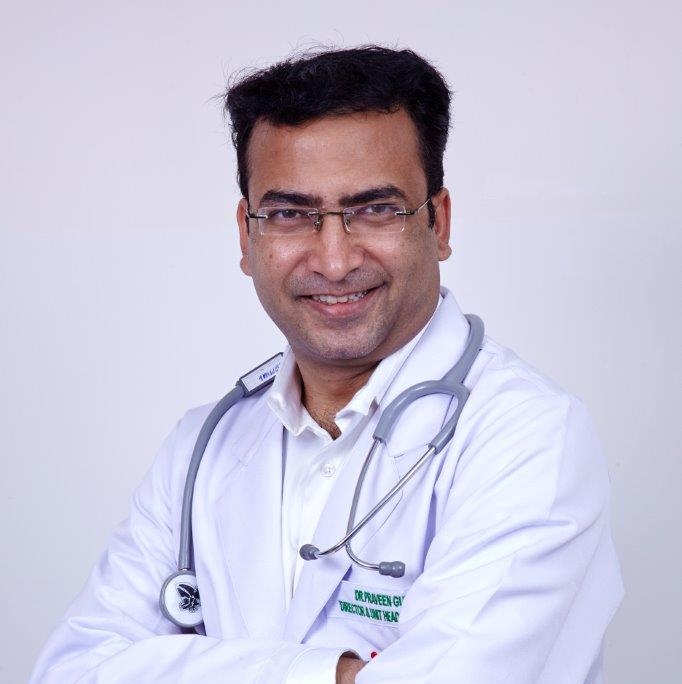
DR PRAVEEN GUPTA
Neurologist
- Fees: INR 1,200
-
Monday 11:30 AM - 3:30 PM, 6:00 PM - 7:30 PM
(See all timing)Monday 11:30 AM - 3:30 PM, 6:00 PM - 7:30 PM,
Tuesday 11:30 AM - 3:30 PM,
Wednesday 11:30 AM - 3:30 PM, 6:00 PM - 7:30 PM,
Thursday 11:30 AM - 3:30 PM, 6:00 PM - 7:30 PM,
Friday 11:30 AM - 3:30 PM,
Saturday 11:30 AM - 6:00 PM
Introduction
Dr. Praveen Gupta is one of the eminent neurologists in Gurgaon and has experience of 9 years in his field. Dr. Gupta has got the credit of starting the first stroke center in Gurgaon. He was also the first to use solitaire for mechanical thrombolysis. Dr. Gupta is frequently invited as a speaker at National and International Conferences, Treatments and Services and Complete neuroscience centers providing most advanced intervention in all forms including all kind of stroke intervention/stroke rehabilitation / Botox / cerebral palsy/advanced second line management for multiple sclerosis / epileptic surgery / DBS surgery for PD patients.
Hospital Associations
Fortis Memorial Research Institute, Gurgaon
Services/Interest
- Headaches
- Parkinson's Disease
- Migraine
- Epilepsy
- Stroke
- Somatoform disorder
- DBS for Parkinsonism and Epilepsy
Experience
Dr. Praveen Gupta is one of the best neurologists in Gurgaon and has an experience of over 9 years. Dr. Praveen Gupta has worked in the Neurology department in two large corporate hospitals in Paras and Artemis, seeing largest no. of OPD (100 Patients per day) and IPD (50 patients per day).
Professional Memberships
Member of Indian Association of Neurology (IAN). Member of Association of physicians of India (API).
Awards and Recognitions
AIIMS Gold Medalist. B R Ambedkar Seva Ratna Award. Best neurologist in Delhi NCR by Times Research. Recipient of Golden Achiever’s Award and Sarvashestra Chikitsak samman.
Education
MBBS, MD, DM(Neurology).
I Speak
English, Hindi
Feedback For Dr Praveen Gupta
Write FeedbackFortis Memorial Research Institute Gurgaon Timing
Monday
11:30 AM - 3:30 PM, 6:00 PM - 7:30 PM
Tuesday
11:30 AM - 3:30 PM
Wednesday
11:30 AM - 3:30 PM, 6:00 PM - 7:30 PM
Thursday
11:30 AM - 3:30 PM, 6:00 PM - 7:30 PM
Friday
11:30 AM - 3:30 PM
Saturday
11:30 AM - 6:00 PM
What is a neurologist?
Neurology is the branch of medicine that focuses on study and treatment of disorders of the nervous system. A neurologist is a physician who specializes in treating diseases of the nervous system which is made of two parts: the central and peripheral nervous system. It includes the brain and spinal cord.
Before neurologists can practice, they must:
- Graduate from medical school
- Complete an internship
- Receive 3 years of training in a Neurology residency program.
What are the diseases treated by the neurologists?
- Stroke and Neurological trauma
- Tumors of the nervous system
- Infections of the nervous system
- Multiple sclerosis and other autoimmune diseases
- Epilepsy and Headaches
- Peripheral nerve disease
- Neuromuscular diseases
- Dementia
- Movement and Sleep disorders
When should you go and see a neurologist?
A person should go and see a neurologist if he is suffering from:
- Severe headaches and chronic pain.
- Dizziness, numbness or tingling.
- Chronic weakness.
- Problems with movement and vision problems.
- Seizures
- Difficulty in thinking and sleep problems.
What tests are done by a neurologist?
Tests performed by neurologists are Neurological Diagnostic Tests, Brainstem Auditory Evoked Response (BAER) Test, Carotid Duplex (Carotid Ultrasound), Cerebral Angiography (Also Called Vertebral Angiogram or Carotid Angiogram), Computed Tomography (CT or CAT scan), Discography, Doppler Ultrasound, Electroencephalogram (EEG), Electromyography (EMG), Intrathecal Contrast Enhanced CAT Scan, Lumbar Puncture (Spinal Tap), Magnetic Resonance Imaging (MRI), Magnetic Resonance Angiogram (MRA)/Magnetic Resonance Venogram (MRV), Myelogram, Nerve Conduction Study, Oculoplethysmography (OPG), Positron Emission Tomography (PET) Scan, Selective Nerve Root Block, Single Photon Emission Computed Tomography (SPECT) Scan, and Somatosensory Evoked Response (SSER) Test.
What is the difference between neurologist and psychiatrist?
Neurological practice relies on the field of neuroscience, the scientific study of the nervous system while psychiatry is the medical specialty devoted to the diagnosis, prevention, study, and treatment of mental disorders. A neurologist is a physician specializing in the treatment of exogenous (organic) disorders that are caused by organic brain damage, and psychiatrist is a physician that treats endogenous disorders that are not attributable to any external or environmental factor. They are due to biological, physiological, genetic mental reactions, states, and development, which is caused by the internal constitutional disorder.
How to prepare for your first appointment with a neurologist?
Write down the symptoms and other health information, including medications, previous illnesses, allergies, and your family's history of the disease. Make a list of your questions. Have the previous test results sent in advance, or take them with you. Don't be hesitant to ask questions if you're confused about something. Make sure you understand the diagnosis and treatment and any further steps that have been suggested you need to take.
